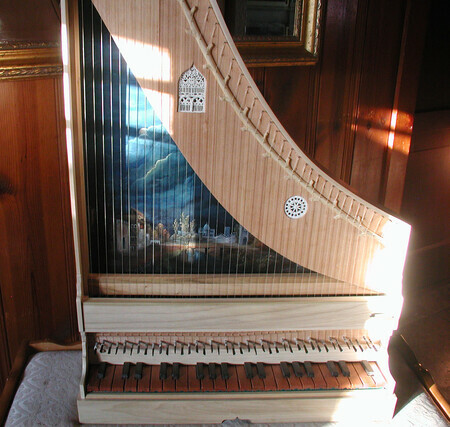The earliest known stringed keyboard instrument appeared in Europe in the 14th century and called a “chekker.” The problem is, we have no idea what this keyboard is today and so no idea of the action used to vibrate the strings. It may be the same instrument mentioned in 1388 in a letter written by King John of Aragon in which he makes reference to “an instrument seeming like organs, that sounds with strings” but he did not mention this instrument by name. Likening its appearance to an organ indicates that it may have had an upright sound chamber and so might have been early upright harpsichord called a clavicytherium.

The shape is similar to the water organ known as a hydraulis:

Galpin thought the chekker was a synonymous with a hammered instrument called a dulce melos (literally “sweet limb”). In that day, however, hammered stringed instruments were very rare while references to the chekker abound in literature of this period indicating that it was common. Moreover, the dulce melos was closer to being a hackbrett and was certainly not a keyboard:

We know that chekker was not a generic term like clavier being that instruments as the clavichord, harpsichord, spinet and virginal were not known in those days and so there could have been no general title to know them under. Chekker had to be the name of an actual instrument. Some think it may have been an alternate or early name for the clavichord and I think this is probably true or it was an instrument very similar to the clavichord.
One clue would be in the very word “chekker.” What does it mean? Galpin thought it meant that the movement of the keys were checked or stopped. But since the motion of any keyboard is stopped, it does not seem likely that this would be seen as any kind of distinguishing characteristic. Chekker in French was often rendered as eschaquier and other closer variations. In Argonese Spanish, the spelling is eschaquer. The spellings are very close to exchequer. The normal definition of exchequer as a department or office involved in the collection and management of national or royal revenues (basically a treasury) is not the original meaning. An exchequer is actually a rectangular abacus as shown below:

A person playing a clavichord does resemble someone working an abacus and since the clavichord is small and rectangular and an abacus was a familiar device to musical theoreticians and composers.

